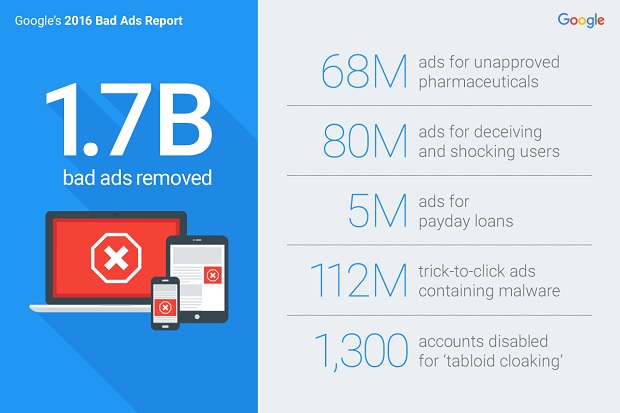Google took down 1.7bn bad ads last year, more than double the number it took down in 2015, according to its Bad Ads Report.
The company says efforts to crack down on payday loan ads, ads that look like system errors and fake news ads were among those that led to an increase in removed ads in 2016.
The new policy of removing payday loan ads that don’t meet certain criteria went into effect in July. Google says it took down more than five million payday loan ads since that time.
The Silicon Valley giant’s clampdown on “bad actors” in its advertising network also saw the suspension of more than 1,300 accounts for “tabloid cloaking”, a scam where advertisers game the Google system with fake headlines in order to sell weight loss products.
Scott Spencer, Google’s director of product management for sustainable ads, said 2016 had seen the rise of “cloakers” that take advantage of hot topics such as a government election, a trending news story or a well-known celebrity.
“Their ads can look like headlines for real articles on a news website. But when people click on that story about Ellen DeGeneres and aliens, they go to a site selling weight loss products,” he wrote in a Google blog post published on Wednesday.
Spencer said this type of “bad ad” was gaining in popularity because people were clicking on them.
“A handful of scammers can pump out a lot of bad ads: during a single sweep for tabloid cloaking in December 2016, we took down 22 cloakers that were responsible for ads seen over 20 million times by people online in a single week.”
Separately, Google reviewed 550 sites suspected of misrepresenting content to users, with some of these found to be “impersonating” news organisations.
“We took action against 340 of them for violating our policies, both misrepresentation and other offences, and nearly 200 publishers were kicked out of our network permanently,” Spencer wrote.
Like Facebook, the tech behemoth found itself caught up in the “fake news” controversy in 2016. Sites that trumpeted falsehoods were found in some instances to rank highly in Google’s search results.
Google admitted, however, that in 2016 it “saw a need” to step up its war against “misrepresentative content”, with a new policy aimed at taking action at deceptive websites introduced in November.
The firm employs a team of engineers, policy experts and product managers to wage what it calls a daily fight against misleading, inappropriate or harmful advertising – an activity that it said could become “a cat and mouse game”.

